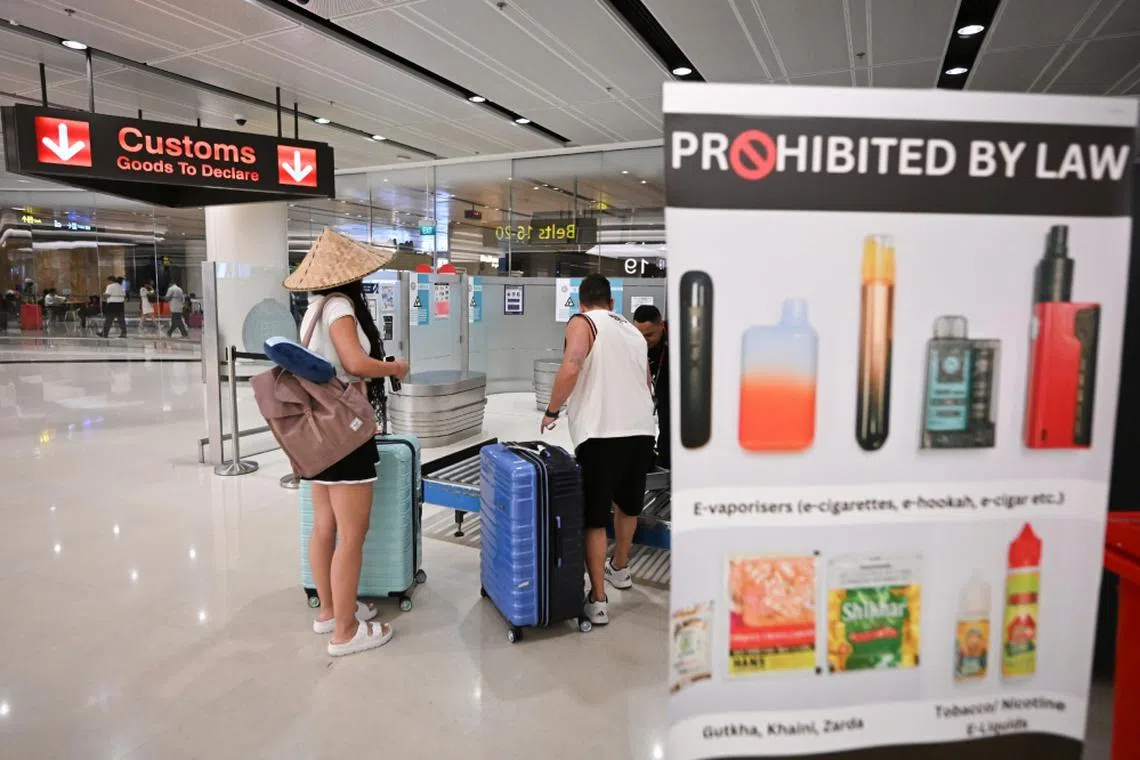Foreigners caught vaping may have passes revoked, be banned from re-entering Singapore
Sign up now: Get ST's newsletters delivered to your inbox

The tougher measures are part of moves by the Government to tackle the vaping scourge.
ST PHOTO: LIM YAOHUI
- Stiffer penalties for vaping offences will apply to tourists and foreigners in Singapore from Sept 1, 2025, including possible deportation.
- Repeat offenders and those possessing or testing positive for etomidate will face pass revocation, deportation and a ban from re-entry.
- MOM officers will support HSA enforcement, educating migrant workers about vaping consequences; ICA is increasing border checks and seizures.
AI generated
SINGAPORE – Foreigners who are caught vaping risk having their passes revoked, being deported and banned from re-entering Singapore, under stiffer measures that will kick in from Sept 1.
The authorities announced on Aug 28 that foreigners caught with e-vaporisers will have their vapes seized, and they will be fined.
Repeat offenders will face more severe consequences, said the Ministry of Health and Ministry of Home Affairs.
Short-Term Visit Pass holders who reoffend will be banned from re-entering Singapore.
Foreigners on a long-term pass, such as an Employment Pass, S Pass, work permit, Student’s Pass, Long-Term Visit Pass or Dependant’s Pass, may have their pass revoked on a third offence. They could also be deported and banned from re-entering Singapore.
Likewise, foreigners caught with etomidate vapes – or Kpods – or those who test positive for the drug, may have their passes revoked, be deported and banned from entering Singapore.
Any appeals will be considered on a case-by-case basis, the authorities said.
The tougher measures are part of moves by the Government to tackle the vaping scourge.
Speaking at a press conference to announce the measures, Home Affairs Minister K. Shanmugam said: “Some leniency will be exercised for young persons, foreigners if they are on long-term passes for the first time. (For) second-time (offenders)... they will have to leave.”
Travellers flying into Singapore or transiting at Changi Airport will also notice more announcements and vape bins at the airport.
Said Health Minister Ong Ye Kung: “Now you have to listen to quite a few announcements. Drugs are very serious. Chewing gum is not allowed. And vapes, please dump them.”
Mr Shanmugam said transit passengers can declare and dispose of their vapes in prominent red bins at the airport.
If they get caught, then officers would need to assess if the vapes found on them are for trafficking.
Added Mr Shanmugam: “But if you are an abuser, and you are transiting through Singapore, and we notice... A question we’ll have to assess is, how much resources do we want to expend by arresting you, bringing you in(to) Singapore and then giving you rehabilitation? We’ll have to take a sensible approach on these things.”
Under the tightened measures

Adults will be handed a $700 fine for a first offence, up from $500.
In recent months, the Immigration and Checkpoints Authority (ICA) has stepped up enforcement checks at Singapore’s borders.
Between Aug 18 and 22, 184 vape cases were detected at Singapore’s sea, air and land checkpoints,
On Aug 27, ICA officers arrested a Malaysian man at the Woodlands Checkpoint for attempting to smuggle over 890 vapes and 6,700 vape components
700 MOM officers to support HSA
Migrant workers caught vaping here will also face stiffer penalties, said Minister of State for Manpower Dinesh Vasu Dash.
Almost 700 officers from the Ministry of Manpower (MOM) have been granted powers to take enforcement action against vaping. A small number of them will be seconded to the Health Sciences Authority
“We will also intensify our education and engagement efforts, particularly with our migrant workers and migrant domestic workers, on the dangers and legal consequences of vaping,” said Mr Dinesh.
MOM will distribute educational material in the migrant workers’ native language via outreach channels, including migrant domestic worker WhatsApp channels, he added.
The ministry will also work with dormitory operators, employers and non-governmental organisations to spread the message.
Fortunately, the vaping incidence among migrant workers in dorms is low, Mr Dinesh said.
He added: “All work-pass holders must also abide by Singapore law, and those caught in possession and use of e-vaporisers will face enforcement actions, including having their work passes revoked and (being) banned from working in Singapore.”




